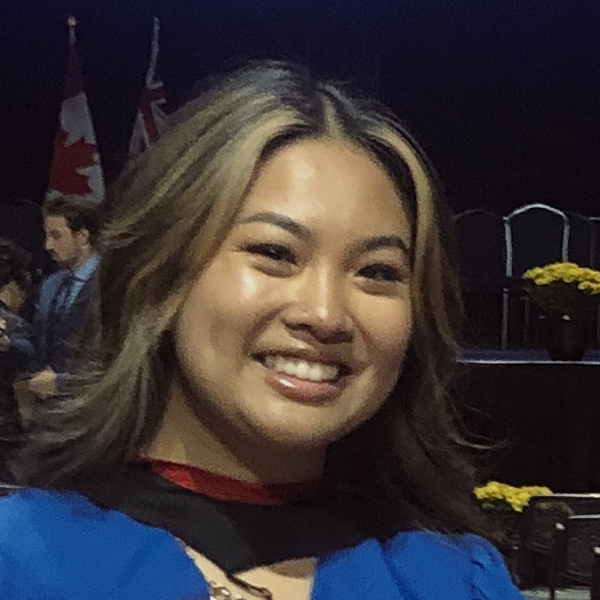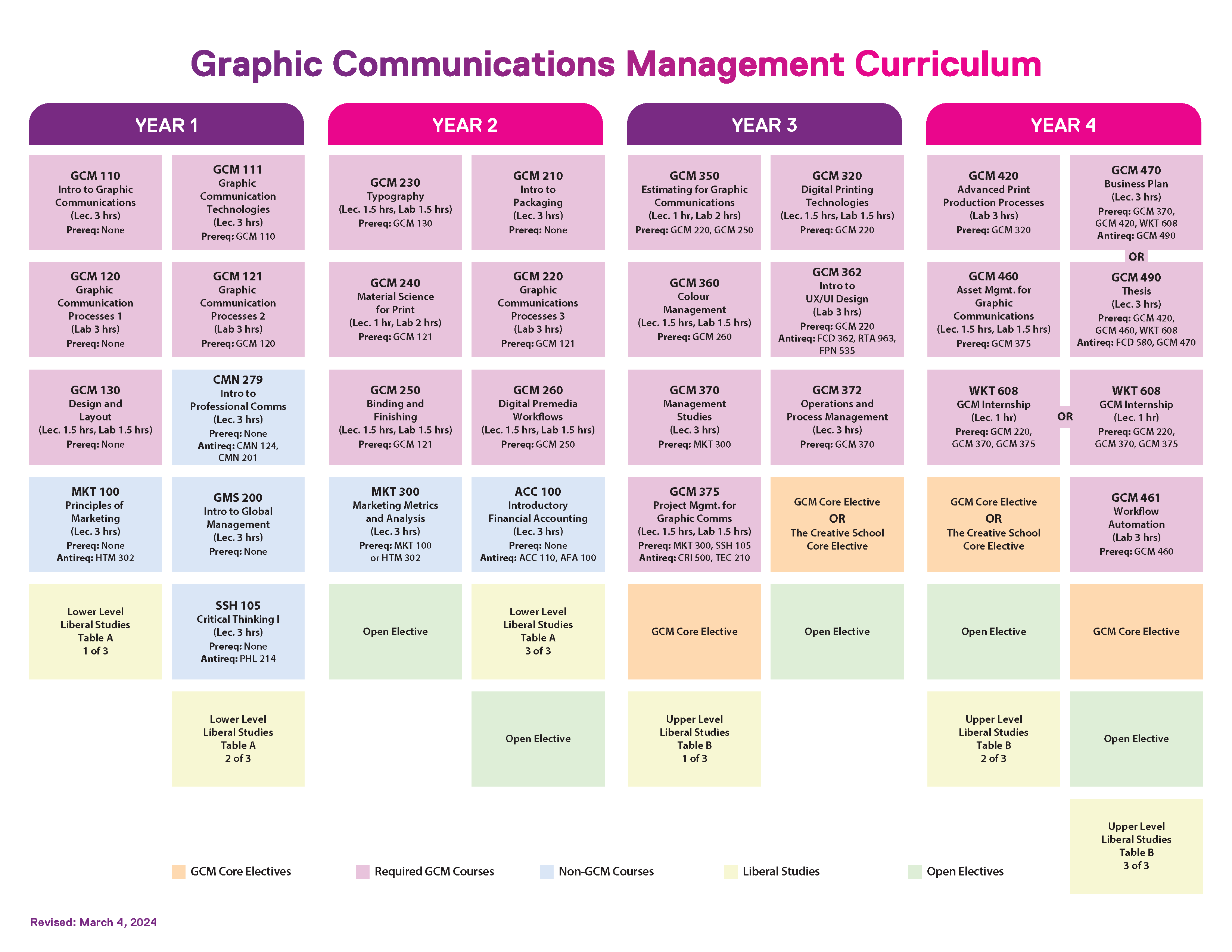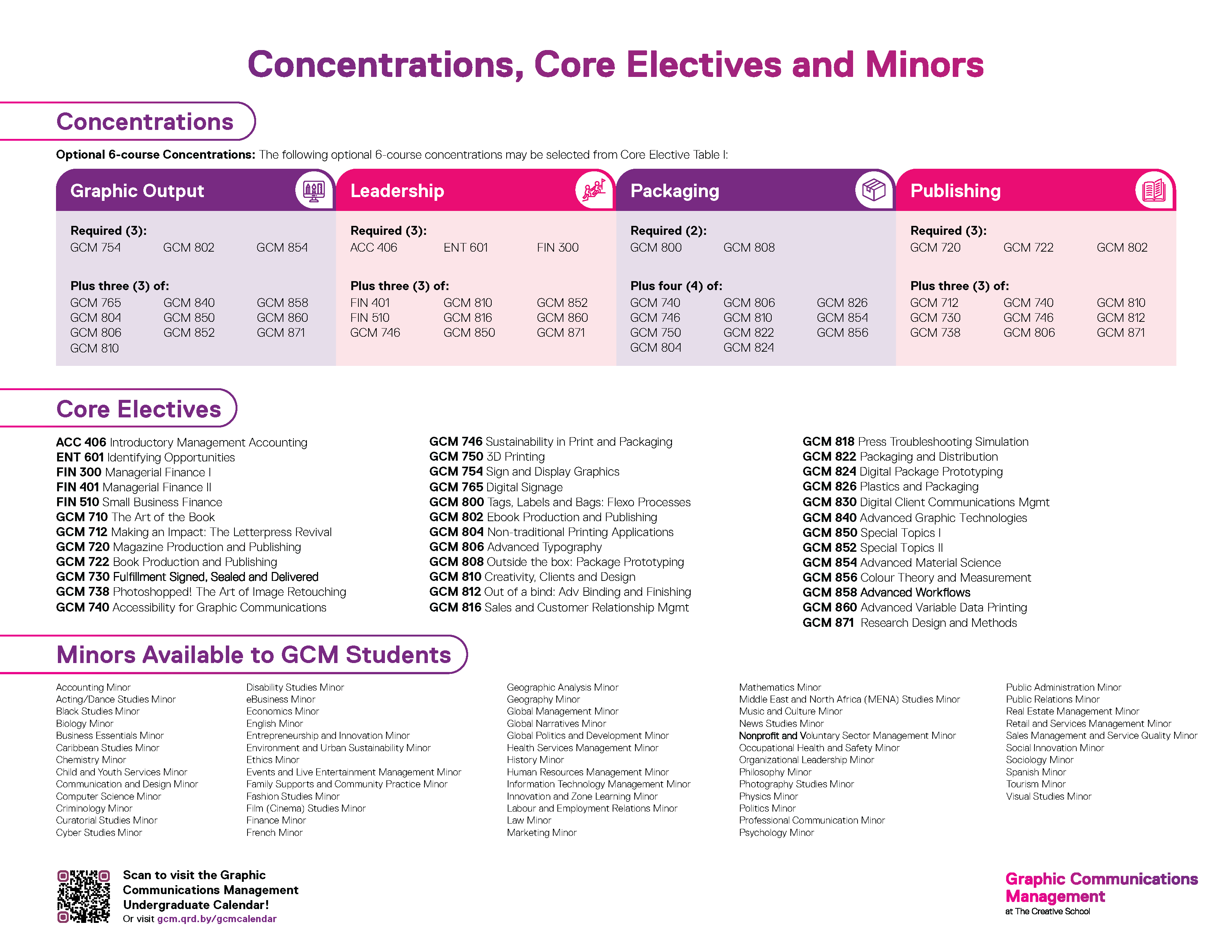Academic Resources
Curriculum
GCM requires four years of full-time study, two terms per year: Fall (September – December) and Winter (January – April). An internship placement takes place between third and fourth years.
Students complete a range of courses to help prepare them for their future careers. These courses are split into the following areas:
These courses give you the standard skills needed in the graphic communications world.
Courses include:
- Introduction to Graphic Communications
- Layout and Typography
- Consumer Packaging
- Graphic Communication Technologies and Processes
- Binding and Finishing
- Premedia Workflows
- Color Management
- Web and Cross-Media
- Workflow Automation
These courses help you develop skills needed to work within companies, manage teams and lead people.
Courses include:
- Professional Communication
- Global Management
- Marketing
- Accounting
- Management Studies
- Project Management
- Operations Management
- Estimating and Selling for Graphic Communications
Core Electives are directly related to GCM and can help you specialize your degree. Learn more about GCM Core Electives.
Open Electives and Liberal Studies allow you to study other subjects that interest you outside GCM and Business, and help you understand the social, cultural and economic contexts in which you’re working. Learn more about Open Electives and Liberal studies.
In addition to the Major in GCM, students may choose from a wide variety of Minors. Scroll down to learn more about what Minors are offered and how you can declare one.
To see a complete overview of your four years at GCM, view the full GCM curriculum guide or click the image below.
If you have any questions about your degree requirements, Academic Coordinator Stephanie Law (stephanie.law@torontomu.ca) will be happy to help you.
If you are looking for information about the part time Certificate in Graphic Communications, please visit the Chang School of Continuing Education (opens in new window) .
Academic Advisor and Resources
At GCM, Stephanie Law is your dedicated Academic Advisor to help guide you through your time here. You can look to Stephanie for advice on the program, course selection, petitioning, academic probation and more. Please contact Stephanie at stephanie.law@torontomu.ca to get in touch.
Toronto Metropolitan University also provides many handy guides for academic and administrative processes. Before you contact the office, see if any of the links below can help you:
Academic Planning and Course Selection
- Toronto Metropolitan Calendar and Important Dates (opens in new window)
- MyServiceHub Support
- How to Access Your Advisement Report
- How to Run Your Advisement Report (external link) (video)
- Fees, Scholarships and Financial Assistance (opens in new window)
- Senate Policies (opens in new window)
- Completing Winter Course Intentions (external link) (video)
- GCM Concentrations (external link) (video)
Student Guides
- (PDF file) GCM Student Guide
- The GCM Student Guide has everything you need to know during your time at Toronto Metropolitan, from academic procedures and exam policies, to scholarships and student groups around campus.
- (PDF file) GCM Internship Guide
If none of the links above address your question, book an appointment with the office by emailing, calling or visiting the GCM office:
GCM Office
gcmadmin@torontomu.ca (opens in new window)
(416) 979-5050
Video Resources
GCM Concentrations
Run your Advisement Report
Winter Course Intentions
Internship
Internships are a great way to gain industry experience, make valuable connections, and maybe even earn some money! You can find all relevant information in the official GCM Internship Handbook below!
Are you an employer seeking a GCM intern? The best way to connect with students is through our Career Fair (opens in new window) (held in March for a summer intern)! You can also find out more information through our internship handbook below, or contact us at gcminternship@torontomu.ca (opens in new window) .
View the (PDF file) GCM Internship Handbook.
Minors
Minors give you the opportunity to hone skills outside of those gained at GCM. Toronto Metropolitan currently offers over 50 Minors today, and you can obtain one by completing six elective courses in a specific subject. Learn more about what Minors are offered and how you can declare one.
Concentrations
Concentrations are a way for you to customize your degree and graduate with a unique skill set. By focusing on a specific area within graphic communications, students are able to study topics that interest them in more depth. There are currently four concentration topics to choose from:
Design and create the graphics, structural and sustainability aspects of product packaging to engage consumers, convey the product’s essence and value, protect the contents, and meet logistical requirements.
- Perfect fit if you: appreciate the 3D structure of printed form and enjoy working with recognizable brands.
- Areas of focus: flexo printing; package prototyping; accessibility; sustainability; 3D printing; non-traditional printing; distribution; plastic in packaging; material science; and colour theory.

"I had an amazing time pursuing the Packaging Concentration! When I started working, I had a solid idea of what packaging dielines and structures looked like. I also used colour management and I saw printer proofs daily. Having knowledge of packaging terminology boosted my confidence in being part of the industry.
Print and packaging are constantly evolving, which was interesting to learn about in class. My favourite project has to be redesigning Turtles packaging in GCM 808: Package Prototyping. I loved the freedom of bringing our ideas together with my peers and thinking of ways to make packaging more innovative. We had industry professionals that guided and critiqued our pieces, which was exciting since I have never felt so seen by experts."
Julius Rodrigo
Concentration in Packaging
Project Manager
Focusing on the digital premedia files and data that are essential to many forms of graphic output, including signage, ebooks and designs of all types.
- Perfect fit if you: are passionate about designing and preparing files for different media.
- Areas of focus: signage; ebooks; typography; workflows; variable data printing; material science; and non-traditional printing.

"Achieving the Digital Graphic Output Concentration was an overall great experience. Many of the courses included active, in-depth conversations around relevant topics. Here are a few courses that stood out:
- GCM 810: Creativity, Clients, and Design – understanding the importance of innovative, creative thinking to solve a problem while retaining an EDI (equity, diversity, inclusion) lens;
- GCM 806: Advanced Typography – an in-depth analysis of different typefaces, being intentional with type when considering the audience and the end-use, and creating your own typeface;
- GCM 850*: Directed Studies I: Issues and Trends – the topic for the term revolved around digital signage, its implementation into different sectors, and its prevalence in everyday life. [*Please note the topic for this course changes every semester]"
Lara Denise Capistrano
Concentration in Graphic Output
Graphic Designer and Production Artist
Learn how to guide and manage a team, oversee projects, make strategic decisions, and foster a creative and collaborative environment to achieve business goals and deliver high-quality solutions.
- Perfect fit if you: like to focus on the strategic vision of a project and planning what needs to be done to achieve it.
- Areas of focus: business; entrepreneurship; management; accounting and finance; sustainability; and client/customer management.

"I produce a variety of creative work across photography, design, web, print, and video. I really enjoy the business development components of my role, be it strategy, branding, our website, marketing, or continuous improvement for our organization.
My Leadership Concentration offered opportunities to further develop critical and entrepreneurial thinking, which comes into play every single day in my job. The Concentration taught me to be capable of strategizing for the big picture while also managing the operations and other daily details of production. I feel confident in my current position and capable of collaborating in the growth and development of a business, even as I am only one year out of school."
Allison MacKenzie
Concentration in Leadership
Multimedia Design Lead
Design and layout of publications, such as books and ebooks, magazines, and brochures. Focus on presenting content in an aesthetically pleasing and readable manner.
- Perfect fit if you: enjoy seeing your work come to life in a printed form.
- Areas of focus: magazine production; book publishing; ebook production; letterpress; Photoshop; accessibility; sustainability; typography; and binding.

"The Concentration involved the use of Adobe design software, giving me a foundation in graphic design that I use in developing my course materials and graphic design projects.
I enjoyed all of the project-based courses in the Concentration, like GCM 720: Magazine Production and Publishing, GCM 722: Book Production and Publishing and GCM 738: Photoshopped! The Art of Image Retouching. Projects involved creating a book layout, a magazine, and album art were fun and great training in software. The course instructors were fantastic, and I greatly improved my skills and abilities through these classes."
Sarah Zahavi
Concentration in Publishing
Media Arts & Communications Teacher
Completion of a Concentration is optional. Doing so will help you to achieve a level of expertise beyond the core curriculum and set yourself apart from others when entering the workforce. If you’re interested in pursuing a concentration, connect with the GCM Office at stephanie.law@torontomu.ca (opens in new window) .
FAQ for First-Year Students
Before applying for residence please ensure you have received a full or conditional undergraduate offer to Toronto Metropolitan. You will receive frequent emails with reminders and information.
Please visit the Toronto Metropolitan Housing & Residence website for important dates.
Submit your transfer credit application as soon you have accepted your offer of admission. Please visit the Transfer Credits page for information on eligibility, application instructions and deadlines.
Yes, paying your Tuition Deposit is an essential step for confirming your spot at Toronto Metropolitan. Visit the Fee Payments page from the Registrar's Office for more information.
Incoming students are automatically enrolled into their Fall and Winter semester required courses. You will have to enroll in your Liberal Studies course (details in question below). If you have more questions please don’t hesitate to contact GCM's Academic Coordinator via email (stephanie.law@torontomu.ca).
Please visit this page for a full list of Significant Dates at Toronto Metropolitan.
Please visit this page for a full list of Significant Dates at Toronto Metropolitan. Please visit this page for a list of Liberal Table A courses.
You must apply and upload all supporting documents via Apply for Financial Assistance (OSAP) (external link) . Please visit this page for important dates.
A minimum internet speed of 150 Mbps is recommended for a stable connection for Zoom meetings.
GCM is has one (1x) all Apple iMac lab as well as one (1x) all Dell Optiplex lab.
Below you will find minimum (not the latest) specs for hardware that we recommend for students.
1. Apple Macintosh Hardware (external link, opens in new window)
Mac laptops should minimum intel core i3 or new M1,M2 or M3 chipsets; 16 GB RAM, a good video card with 2GB RAM (not RAM shared), and high-speed internal 500GB HDD (preferably 500GB SSD). A 13" or 15" laptop (or desktop with 21" monitor) and Windows 10/12 OS system is recommended.
Mac computers: Students can purchase a Mac computer online. Toronto Metropolitan students are eligible for a student discount on the Apple website (external link) .
2. PC Laptop and Desktop Hardware (external link, opens in new window)
PCs should have minimum intel core i5, 16 GB RAM, a good video card with 2GB RAM (not RAM shared), and high-speed internal 500GB HDD (preferably 500GB SSD). A 13" or 15" laptop (or desktop with 21" monitor) and Windows 10/12 OS system is recommended.
Toronto Metropolitan students are eligible for a discounted student rate on Dell computers (external link) .
FAQ for Returning Students
Please visit this page for a full list of Significant Dates at TMU.
Please visit this page for a full list of Significant Dates at Toronto Metropolitan.
You are only allowed to take four (4) courses while on Probation.
You are only required to declare your Minor when you Apply to Graduate. If you have taken the required courses and the Minor is approved, it will appear on your record (MyServiceHub and diploma).
Yes it is possible to complete both, but neither is mandatory.
Run your Advisement Report (self-service tool in MyServiceHub) to track your degree progress. For more academic resources, visit the Graphic Communications Management - Academics website.
You need to add a concentration in MyServiceHub in order to claim your Concentration. You must do this before you graduate. However, the advantage to adding your concentration early is that it makes it easy to track your concentration progress in your Advisement Report. If you want to add a second concentration, contact Curriculum Advising (gradinfo@torontomu.ca).

